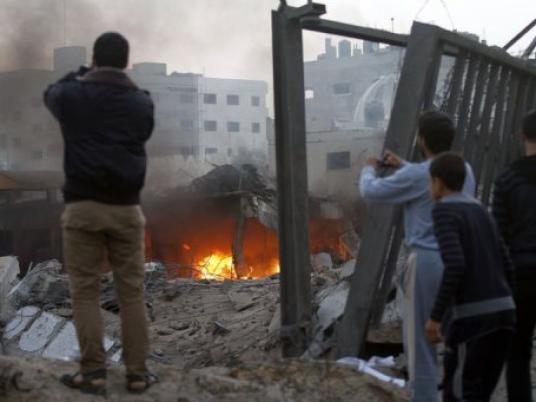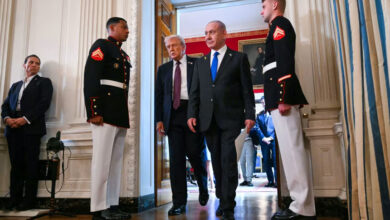
GAZA — Tahani al-Dalu was chatting with her neighbors from her window in Gaza City. She had a lot to talk about this time, more than the usual. Israel’s Operation Pillar of Defense had been raging for four days already. Israeli missiles were hitting everywhere and at all times.
The people of Gaza were getting used to it, but not quite. On the one hand, why worry when nothing can protect you? On the other hand, there was a deep, silent anxiety with every bomb dropped. Everyone stayed home. Going out risked being shot or identified by one of the drones buzzing constantly above.
Tahani, a 50-year-old pious mother and grandmother, wasn’t only spending her time chatting. For years, she took Quran recitation courses. Recently she began teaching in a nearby mosque called Shouhada al-Nasr, or Martyrs of Victory. Reciting the Quran is an art, and she excels at it. But that’s not the only thing she is known for. Tahani is a fashionable woman, and has taken hairdressing lessons. For every occasion, she wears her most beautiful headscarf.
Tahani’s daughter, Ranin, was preparing lunch for 12 family members. And while her mother is talkative and lively, 25-year-old Ranin is more introverted. She is recovering from her recent divorce. She married her cousin two years ago, a common occurrence in Palestine. Ranin’s parents were concerned about a potential consanguinity problem. They consulted a doctor who reassured them, but then Ranin’s first daughter died at a very young age. Five months ago, she gave birth to a boy with special needs.
Being a special needs case in Gaza is worse than almost anywhere else. Having access to healthcare is limited due to the blockade that has affected the territory since 2007. Gazans should have access to health services in the West Bank, but for this to happen, they have to get out of Gaza through the Israeli Erez crossing, a tumultuous process. As a result, one to two people die every month in Gaza from curable diseases, according to the World Health Organization.
Ranin got divorced, while her husband kept the 5-month-old boy. She went back to her parents, with no prospects of remarrying. But she has
been getting more jovial since her parents’ return from the pilgrimage, 20 days before. They won Saudi Arabia’s lottery, a way to select among the growing numbers of those wishing to perform pilgrimage for free.
Tahani and Jamal al-Dalu, her husband, have been waiting for their turn for six years. “It was a blessing, a real blessing,” Jamal repeats. Winning the lottery for a pilgrimage is only the beginning of a long process. Leaving Gaza is difficult whether through Israel or Egypt. Getting paperwork done is not easy, while the Egyptian border crossing in Rafah is only open for eight hours a day, for thousands of Palestinians to pass through. “Once we crossed the borders, everything went very fast. Before even realizing it, I had already come back to Gaza,” Jamal recalls.
They came back with gifts for family and neighbors. Tahani became even more qualified for teaching Quran recitation as a “hajja,” a pilgrim who has gone to Mecca. Jamal stocked up many of the gifts in his shop in Souq al-Jawiya instead of cluttering up his big house. On that day, he left early to buy some food and get the rest of the gifts from the shop, to entertain his children and grandchildren, who were getting bored due to the bombing.
Tahani called him several times to specify the things he should bring back home. The children were waiting. Jamal would listen a lot to his wife. But he is often absent-minded. He never did well in school, and hence took over his father’s shop and the small house in the quiet neighborhood, where he married Tahani 30 years ago. Year after year, he expands on the house, adding a new storey and buying more furniture. The house is minimalistic in decoration; the only fancy object the pottery that Tahani made during her free time, a kitsch-looking decoration filled with shellfish picked up from the beach of Gaza.
Going to town was risky. Jamal chose to go with his neighbor by car, hoping not to be targeted by the looming F-16s. He got angry when he saw his youngest son, Abdallah, arriving. Abdallah wanted to help. Like his father, he was destined to eventually take over his shop, since his grades at school were not so good. Like his father, he was absent-minded. At 18, the dreamful man was the youngest among his eight siblings. He often stayed home, with the women and children of the family. He was close to his nephews and nieces, to whom he related as an older brother more than an uncle.
Around 2:30 pm, everything was ready and it was time to go back home for lunch. Jamal decided to go pray while Abdallah waited for him downstairs. His phone, meanwhile, was incessantly ringing. At the Dalus’ place, the children were singing by the window just before lunch. Like most Gazan children, they spent most of their time in the streets, but since the bombing began, they weren’t allowed to go out. They were singing a song they learned from a Jordanian channel — the kind of channel children force their parents to watch, especially when there’s nothing else to do during a war except hoping to survive. "Dad, bring me a balloon, a red and yellow balloon. He blew it for me. Then it flew and burst. I was sad. But he got me another one. May God bless him with the light of my eyes."
Jamal’s oldest grandchild, Sara, is the loudest. At 7, she is among the top students of her class.
Fahmy al-Dalu, Jamal’s nephew, could hear them from his house that was only three meters away. He had already sat down to eat along with his mother, sister and brother. Lunch today was zucchini filled with beef, along with a spicy vegetable salad. Fahmy was complaining. His mother loves spicy meals, while he, a 28-year-old raised in the United Arab Emirates, is used to eating fast food. “You shouldn’t cook that spicy, it’s not good for your asthma,” Fahmy told his mother. They argued on the subject for a moment, before the majority of the Dalu family was gone.
A bomb was thrown from an F-16. A small Guided Bomb Unit, or GBU, it is supposedly created to avoid collateral damage. Guided by GPS, the bomb rarely misses its target, and the effect of the dispersion of the explosion is minimized. The shrapnel rises to the top, then falls off, straight to the ground. This type of missile was used during the last war in Gaza, in 2008 to 2009.
Fahmy, the one who doesn’t like spicy food, was thrown on the table of the living room as a result of the blast. The glass of all the houses in the neighborhood exploded. The dust invaded the residential area. But no body heard the explosion. Usually, it was the opposite. This war was loud but invisible. No body saw the drones, the F16s and the bombs, but everybody heard them all the time. This time, it was the other way around.
The Dalu house collapsed. Fahmy fainted. His mother, sister and brother were protected by a section of a wall. They instantly ran away, but once in the streets, the sister realized her older brother was missing. She went back up and shook him. He regained consciousness and walked back down, limping. He was hit in his head, and his neck was strained due to the explosion. The neighbors were running in the streets. It was utter chaos. But the bombsites had a reassuring side — as they say, lightning never strikes the same place twice.
Soon, the neighbors realized the Dalu family was missing. Soon, they realized they were inside the house during the explosion. Soon, they realized the family must have been buried under a smoky pile of cement and twisted steel bars. The ambulances’ sirens were howling. Help arrived. A digger was on its way to disinter potential survivors.
On his way out of the mosque, Jamal saw his son Abdallah, pale and in tears. “They bombed our house,” he said.
The father replied, “It’s impossible, we never did anything.”
In his panicked and delirious state, he imagined his son Mohamed and his grandsons firing rockets into Israel.
“I was trying to find a reason to understand,” says Jamal, who now knows why his phone was ringing incessantly.
Under the rubble, there were 10 people: Tahani, Jamal’s wife; Souheila, his older sister; Mohamed, his son; Samah, his daughter-in-law; Ranin and Yara, his daughters; and his grandchildren Sara, Jamal, Youssef and Ibrahim.
Jamal and Abdallah arrived near the house. The son couldn’t get any closer. He was then eventually taken to Shifa Hospital in downtown Gaza. He would wait for his family to arrive there.
The bombing continued over the next four days, but Jamal’s area had since been spared.
A tent was installed in front of the ruins to receive the hundreds of people who came to silently mourn the dead. Jamal welcomed everybody. He often thinks of Jamal, his favorite grandchild, who carried his name. “I used to spoil him. I used to get him gifts all the time, but from
now on, I won’t be getting anything for anyone,” he says. Holding back his tears, he does not cry.
“I hope someday, the Israelis will undergo the same thing,” he says. Everyone around him approves.
Meanwhile, Israel Defense Forces spokesperson Yoav Mordechai has first mentioned that the target of the attack on the neighborhood was Yehia Rabia, who was responsible for the rocket launchers in Hamas. According to Haaretz newspaper, the Dalu house was targeted “by mistake.”
This would be one of the Israeli army’s worst mistakes during this operation, but it wasn't. Avital Lelbovitch, the official Israeli army spokesperson told AFP on 27 November that they were targeting Mohamed al-Dalu, Jamal's son. "The father was a known terror operative affiliated with the military with Hamas. It's tragic when a terror operative is hiding among civilians but unfortunately it is part of Hamas and Islamic Jihad tactics,"Lelbovitch said.
Back in the neighborhood, Mohamed wasn't often talked about. His neighbors and cousins said he worked as a policeman for Hamas. He also helped his father at the shop. "He was just bringing back shawerma at home for lunch when the house was bombed," Fahmy recalls.
Two bodies were still missing four days after the bombing: Ranin, Jamal's daughter, the divorced woman who only recently regained some joy at the sight of her family returning from pilgrimage., and Mohamed, the "Hamas operative".
On 22 November, a day after the cease-fire, the search for bodies actively resumed again. The bodies were finally exhumed. The smell of death invaded the area; for a short time.
Translated from French by Sandra Manadily.
A version of this piece was published in Egypt Independent's weekly print edition.




